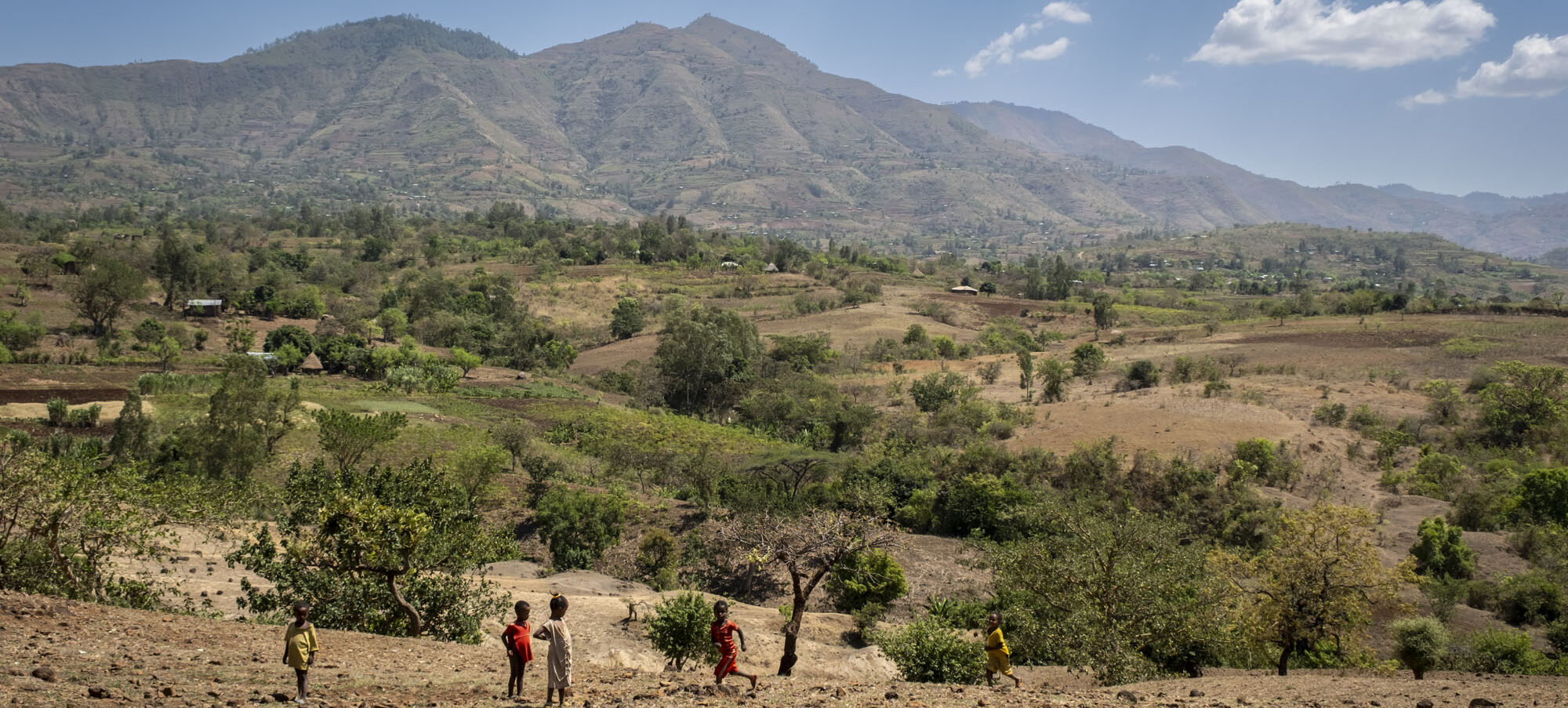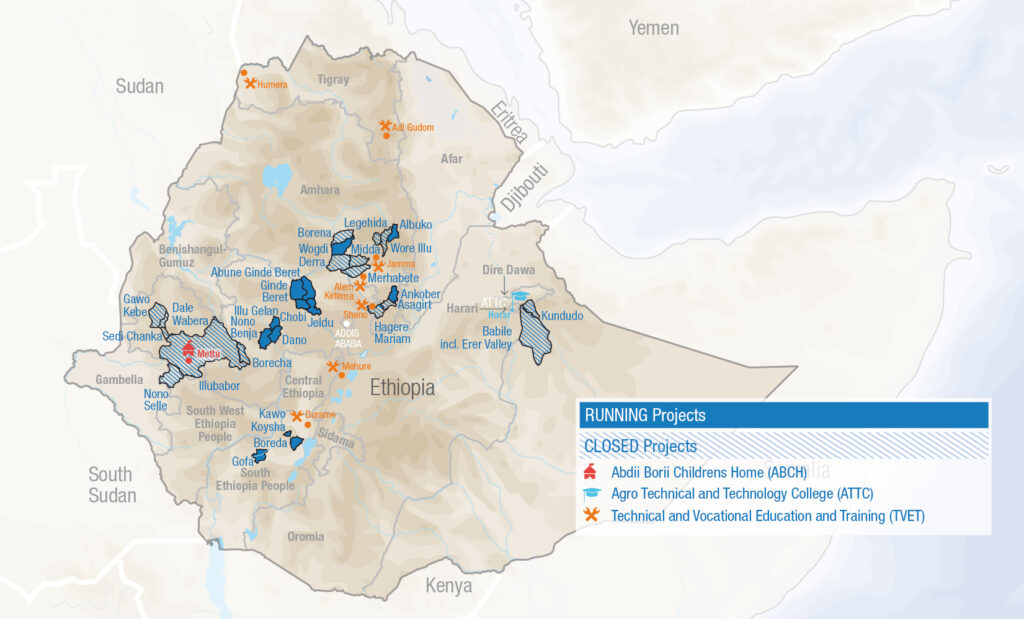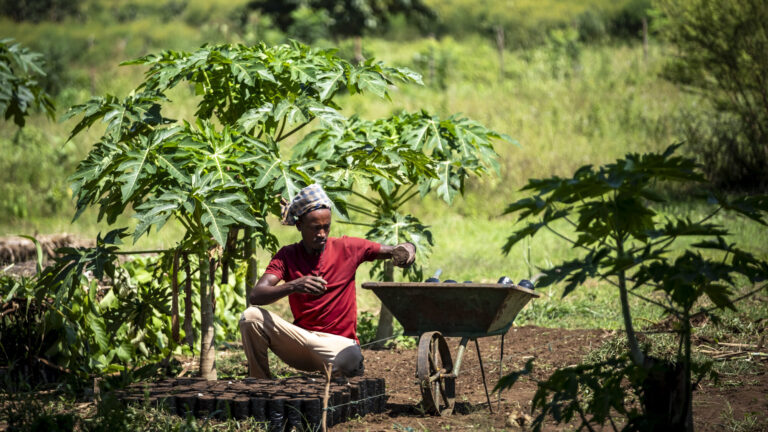
Our project areas
Learn more about our current project areas
The Menschen für Menschen Foundation currently supports children, women and men in thirteen project areas in rural Ethiopia. There are very different challenges and needs depending on the region. While the north is dry and dusty, the west is green and extremely fertile. It is of great importance for our work to integrate the various measures in the areas of agriculture and nutrition, water and hygiene, education, health, social development and income. We consistently involve the local population and work together with the people of Ethiopia to build a sustainable future for their country.

Northern project areas
Heading north from Addis Ababa, the route leads through deep valleys and high mountains to the project areas of Albuko, Ankober and Wogdi. The dusty all-weather roads wind uphill and downhill. The further north you go, the more dramatic the landscape becomes with altitudes reaching up to 2,900 meters – these are the foothills of the African Rift Valley.
The people who live in small villages in this region are poor. It rarely rains, the soil is dry and forest resources have greatly diminished. Wood is mainly needed for cooking and building houses, but there are hardly any forests left as the people in the region have never learned how to reforest. The lack of trees means that the soil is losing its protection. The consequences are dramatic: when it rains in this dry region, the soil cannot absorb the water and devastating floods occur. Consequently, the top and most fertile layer of soil is washed away and the ground becomes even less fertile.
People suffer greatly from the lack of water. The eye disease trachoma is widespread due to a lack of hygiene. Bacteria cause the eyelids to fold inwards, causing the eyelashes to rub against the cornea. This leads to severe pain and even blindness for those affected.
But there is huge potential: New wells, training in improved cultivation methods, reforestation and wood-saving stoves are gradually improving the living conditions of the people. Rivers with water all year round enable irrigated vegetable cultivation and new schools allow children to receive a solid education.



Western project areas
The west is generally much more fertile than the northern project areas and new crops are producing good harvests. But despite the good conditions, the harvests are meagre. Poor seeds and a lack of knowledge about effective farming keep people in malnutrition and undernourishment. Menschen für Menschen therefore supports families with training in improved agricultural cultivation methods and higher-yielding seeds. Step by step and harvest by harvest, yields are improving.
In addition, families drink polluted water, drawn from unprotected water holes from which the cattle also drink. As a result, diarrhea and stomach problems are widespread. Menschen für Menschen is therefore building fenced-in wells from which the children and women can draw clean drinking water.
To improve the families’ income and prepare them for bad times, beekeeping courses are offerd, for example. The previous methods produced a low yield and were also life-threatening for the farmers due to the many stings. Modern beehives improve the quality and quantity of honey and the number of stings can be reduced.
Measures in the areas of education and health are also implemented with new schools being built as well as vaccination campaigns and trachoma operations carried out.



North-western project areas
The people in the north-western project areas of Ginde Beret, Abune Ginde Beret, Jeldu and Chobi depend on the yields from their fields, most of which are too small. The severe deforestation in the region poses particularly great challenges: The soil is no longer fertile and more and more fields are becoming unusable due to severe erosion. The lack of forests also means that natural springs are drying up.
Although there have been repeated efforts to reforest the land in the past, the population lacked the necessary knowledge to implement the measures. There was also a lack of tree seedlings, which are needed in large numbers for the process of reforestation.




The security situation in the north-western project regions is tense due to the activities of insurgent groups. To protect our employees, we have restricted or paused our work in these regions. We will resume our activities as soon as the situation allows.
Southern project areas
The most recent project areas Boreda, Kawo Koysha and Gofa are located around 400 kilometers south of Addis Ababa in the regional state Southern Nations. Menschen für Menschen has been running integrated rural development projects in this region since 2023.
While the area of Boreda covers 464 square kilometers over a high plateau as well as some lower-lying areas on the edge of Lake Abaya, Kawo Koysha, located just a few kilometers northwest of Boreda, extends away from the water at an average altitude of 2,450 meters.
Most of the approximately 175,000 inhabitants of both districts primarily live from agriculture and livestock farming. However, the harvests are very poor, and families often struggle to feed themselves adequately. Over the next few years, we aim to work together with the people there to make their agriculture more efficient and also to build wells, water points, and schools. Women receive microcredits, and we assist in establishing their own small businesses.


